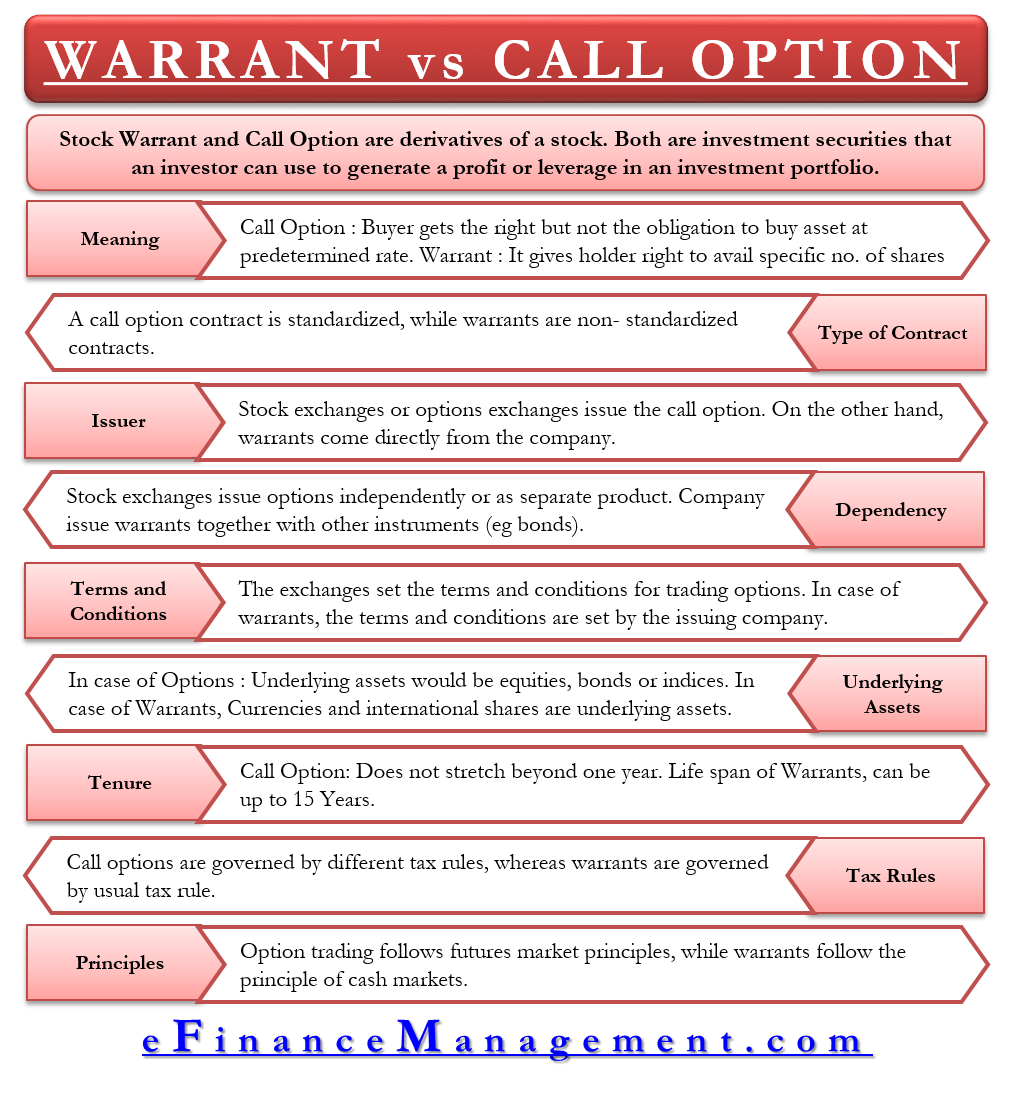Stock Warrant and Call Option are derivatives of a stock. Both are investment securities that an investor can use to generate a profit or leverage in an investment portfolio. These act as a right but not an obligation for the holder to buy the underlying asset at a certain price before the expiration. However, there is one big difference between the warrant vs call option. Warrants are issued directly by the company, while the call option is a contract between two investors. There are more differences between the warrant vs call option, but those we will discuss later in the article.
Benefits of Warrant
A company might issue stock warrants to attract more investors. For a company, a warrant is the source of potential capital in the future when it is looking to raise additional capital without offering other bonds or stocks.
Companies also seek warrants as a potential funding source that can keep them afloat in grave situations such as bankruptcy. Thus, it is a good capitalization option for start-ups or if the company is nearing bankruptcy. Further, some organizations also release warrants to gain goodwill, as convincing investors to pay $50 for a warrant is easy than asking them to buy a $500 share.
It gives investors a chance to buy the shares at a lower price without investing too much. For example, Company A issues bonds of the face value of $200 with a warrant $10 warrant, which will expire after five years. Now, the investor can buy the stock of Company A anytime within five years. They will benefit if the price of the stock is greater than $10.
Benefit of Call Options
A call option is less risky than buying a share as they do not require the same investment as purchasing the stock. There are various strategies that expert traders can apply to minimize downside risks. Options traders do not indulge in too much fundamental research simply because options are extremely short-term trading instruments. Therefore, technical research comes in handy.
Warrant vs Call Option – Differences
Let us now check the differences between warrant vs call option;
Meaning
In the call option, the buyer gets the right but not the obligation to buy the underlying asset at a predetermined rate and time. On the other hand, the stock warrant gives the holder the right to avail of the specific number of shares at a pre-determined price and at a specific date.
Type of Contract
A call option contract is standardized, while warrants are non-standardized contracts.
Who is the Issuer?
Stock exchanges or options exchanges issue the call option. On the other hand, warrants come directly from the company. Also, stock exchanges issue options independently or as a separate product. Companies, however, issue warrants together with other instruments such as bonds.
Who Sets Terms and Conditions?
The exchanges set the terms and conditions for trading options. In the case of warrants, the terms and conditions are set by the issuing company.
Also Read: Warrants
Underlying Assets
In the call option, the underlying asset would be equities, bonds, or indices. The underlying asset in the warrant is usually currencies and international shares.

Type of Products
Products in case of the call option range from equity or index calls and put options. Warrants could be anything from capital guarantee investments and other high-risk/return trading warrants.
Effect of Equity or Total Shares
Issue of the call option does not result in the dilution of equity. Warrant issuance, however, results in dilution of the equity.
Tenure
The lifespan of a call option does not stretch beyond one year. On the other hand, the life span of the warrant can be up to 15 years or as the company decides.
Tax Rules
The call options are governed by different tax rules as they are compensatory in nature. Since warrants are not compensatory in nature, therefore, they follow usual tax rules.
What Principles Apply?
Option trading follows futures market principles, while warrants follow the principle of cash markets. Therefore, one can buy or short a call option or apply various strategies to profit from them. One can’t short warrants like the options. Also, options have margin calls, while there is no margin call in the warrant.
Warrant vs Call Option – Similarities
Along with the differences, the warrant vs call option shares a lot of similarities as well. These are:
- Both warrants and call options give the holder an option to take benefit of the increase or decrease in price without actually holding the real asset.
- Both give the holder the right to buy the underlying asset at a fixed price at a specified future date.
- In both, the holder has no control over the underlying asset until they exercise the call option or warrant.
- Pricing of both the components depends on two components – intrinsic value and time value.
- Common factors such as stock price, expiry, volatility, risk-free return, and so on influence both warrants and call option.
Final Words
Both these instruments allow investors to benefit from stock without actually investing in that stock. However, before going for the stock option or warrant, one should know the pros and cons and the level the risk. After that, an investor should determine an acceptable level of risk and decide accordingly. Also, an investor needs to consider the time horizon of investing – a call option is for the short-term, while the warrants are a long-term investment.

